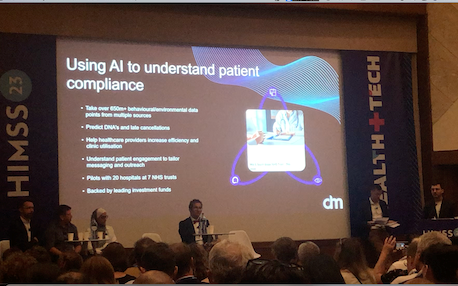In an interesting session at HIMSS this week, Bejyamin Deldar, Co-founder of Deep Medical. Medical Doctor and Researcher, Innovator and Clinical Entrepreneur Fellow at NHS England spoke about using artificial intelligence to understand patient compliance behaviours. He highlighted that globally, $9 trillion is spent on healthcare. However, nearly $300 billion is lost on patients that do not show up. In the U.K., for example, about 1 to 12 patients do not turn up for their appointments. Similarly, in France, accessibility to healthcare is great, but patient compliance issues are still an area of concern. In the U.S., 1 out of 4 patients do not turn up.
It is important to look underneath the actual behaviour as to why patients miss their appointments because patient compliance behaviours and the true barriers behind this issue often result in health inequalities.

Deep Medical has created multiple machine learning models that access data in society and from its healthcare patient administration data. These models generate nearly 650 million points ranging from what the traffic is like to the weather to how many cars a patient has, what their ethnicity is and other similar variables. Using these points, the machine learning model can predict, with about 90% area under the curve, equal accuracy as to which patients are likely to miss their appointment and why and what you can do about it.
Using these machine learning models, a scheduling platform is developed which provides the information 2 to 3 weeks before those patients' appointments. This allows the system to understand the issue. If it is a transport issue, you can organise it for these patients. If it is an operational issue, we determine a solution for that. The goal is to ensure the right communication with the patient to coordinate care.
It's important to talk about this in two ways. It is not just about scheduling things, but how to better communicate with patients; to optimise what we say to patients in the right language.
This is where you can use AI as a better scheduling piece to think about who gets those high-value appointment times first and how we can ensure equity and access and continue to identify patients in need or who continue to be at risk.
Ultimately if you can't get through to them, we ensure we get somebody else involved. By using this three-point method, we're increasing outpatient activity by 9% in an area where no-shows were 6%.
Quite a few studies demonstrate that patients who don't turn up to their appointments have worse outcomes. One, based on the scope with which, respectively, in 2019, patients with long-term conditions found an eight-fold increase in all-cause mortality for every two appointments they missed. Hence, patient compliance is an important area that needs to be addressed and AI can help us do that.
Source: HIMSS23Europe
Slide credit: HIMSS23Europe



























